|
|
Wednesday, 11th February 2026 |
| Regulatory overkill is main risk facing banks according to Banana Skins 2005 |
Back |
| The remorseless rise in regulation has become the greatest risk facing the banking sector according to the latest ‘Banana Skins’ survey conducted by the CSFI, the independent City of London think tank, and sponsored by PricewaterhouseCoopers. The report finds that regulatory overkill saps bank resources, reduces risk diversification and creates a false sense of security. Alan Merriman examines the findings of the report, in which credit risk is the second biggest risk. |
The Banana Skins Survey was first published in June 1994 and quickly became a popular publication in banking circles – provoking a great deal of discussion as it provides a lively ‘tour d’horizon’ of the major concerns of bankers, fund managers, regulators, journalists and analysts around the world.
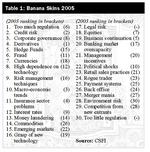 | | Table 1: Banana Skins 2005 |
The remorseless rise in regulation dominates this year’s Centre for the Study of Financial Innovation (CSFI)/PricewaterhouseCoopers (PwC)/ Banana Skins survey of 440 bankers, regulators and other close watchers of the financial scene. This is the first time this particular risk has topped the poll in the ten years that the survey has been conducted, through its steady rise has been charted over the last three years. The costs and distractions of regulation as well as the false sense of security it brings were the main reasons cited for its strong showing. This concern with regulation has particular resonance in Ireland given the current amount of new regulation and legislation directed at the financial services industry in general. Banks and other financial institutions operating in Ireland are currently grappling with the immense compliance challenges posed by the Directors Compliance Statement provisions of the Companies (Auditing & Accounting) Act, 2003, and the Central Bank and Financial Services Authority of Ireland Act, 2004. The resources required to implement these requirements coupled with those needed to manage other regulatory drive projects such as Sarbanes-Oxley and IFRS is resulting in substantial pressures on the industry and is in itself leading to a material risk of management overstretch.
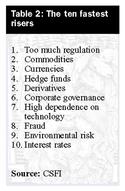 | | Table 2: The ten fastest risers |
Closely linked is the high place given to corporate governance. Although banks are seen to have weaknesses in this area, this Banana Skin also scores strongly because respondents – particularly bankers – perceive it to be a part of the regulatory threat.
Modern trading techniques such as derivatives and hedge funds continue to cause concern, particularly the latter which have risen strongly since the last poll. Two other sharp risers are fraud, notably of the electronic variety, and currency risk centering on the precariousness of the US dollar. Unrest in the Middle East gave strong boost to commodities where the oil and gold markets are seen as potentially threatening.
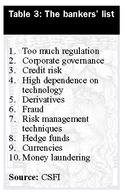 | | Table 3: The bankers’ list |
However, broad concerns about macro-economic trends have eased, along with fears of political shocks and terrorist attacks, as reflected in the sharp decline of concerns about business continuation. Worries about strength of the insurance sector, which featured strongly last time, have also diminished.
Credit risk continues to occupy a high position because of fears that rising interest rates will push up the default rate and cause damage to banks. But banks are also seen to be taking greater risk in order to generate higher business volumes and yields. Vulnerable areas include the property market and the financing of emerging markets.
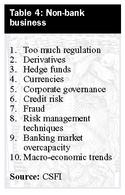 | | Table 4: Non-bank business |
Survey respondents were also asked to state whether they thought individual Banana Skins were rising, steady or falling in severity. The ten fastest risers included most of the highest ranked risks in the overall rankings. A notable extra was environmental risk which, while positioned low in the overall ranking, was seen to be gaining strongly because of fears about the impact of pollution claims and climate change on bank assets and earnings. The lowest risks on this measure were management incentives, competition from new entrants and the rogue trader.
How well equipped are banks to handle these risks?
Survey respondents were asked to rank the preparedness of their own and other institutions to deal with the risks they identified. The results were less positive than in 2003. Of the total respondents, 57 per cent thought institutions were moderately well prepared or better to handle the risks, down from 69 per cent in the previous survey. The main reason was the inclusion of a larger proportion of respondents from emerging market and EU accession countries where bank readiness was seen to be lower than in industrial nations. In the advanced banking markets, the considerable risk control work of recent years is seen to be paying off in higher awareness and better systems, though this is offset by fears that banks may be becoming too complacent or process driven.
Who said what?
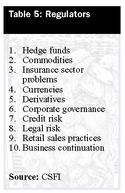 | | Table 5: Regulators |
Bankers and financial practitioners put regulatory issues at the top of the list. But their other concerns were very diverse: crime, technology, risk management, sophisticated instruments. Notable was the absence of pressing concerns about the political and economic outlook apart from the fragility of the US dollar, though even here bankers were less worried about the dollar than other categories of respondents.
Non-bank business respondents (for example, fund managers, insurers, industrialists) were also bothered by the rise in regulation, but focused more squarely on trading risks in derivatives, hedge funds and currencies. They saw banks taking on greater risks than their risk management techniques really justified. They were also the most concerned of the main respondent categories about the macro-economic outlook.
Regulators produced a strikingly different list of concerns from other types of respondent. Not unnaturally, there was less stress on over-regulation. Instead, their focus was on the risks in heavily traded and leveraged markets like hedge funds, commodities, derivatives and currencies. They showed a continuing concern with the insurance sector and with business continuation issues, which have eased elsewhere.
Observers of the financial scene (for example, analysts, rating agencies, academics, journalists) focused heavily on trading risks, and seemed less confident that bankers would be able to handle turbulence in the markets. They shared the financial sector’s worries about the rising regulatory burden, though they also showed concern about weaknesses in corporate governance. They were the only category to have interest rates in their Top Ten.
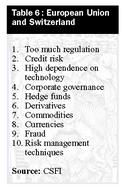 | | Table 6: European Union and Switzerland |
Regulatory overkill topped concerns in Europe, particularly from the City of London where many respondents were based. The main worry was that it would blunt the international competitiveness of the financial sector. Concerns about high dependence on technology were strong, particularly in the areas of operating risk, security and trading models.
Wrap-up
There is no doubt what the overwhelming message is of this year’s survey is: the rise of regulation to the top of the list of concerns, with the sharp difference between the priority concerns of the industry and those of the regulators, perhaps the most worrying aspect of this.
The industry clearly believes that the regulators are getting it wrong, both from a cost perspective, driven by what banks see as an excessive focus on consumer protection, and from too much complexity, which is seen as killing competition and promoting a herd instinct in financial institutions.
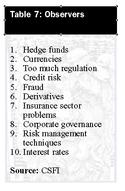 | | Table 7: Observers |
Regulators, however, are more concerned about hedge funds, commodities and exposures to the insurance sector. Only time will tell if banks are underplaying these risks. Regulators are clearly still feeling that institutions have some way to go to embed acceptable retail sales practices.
Whatever your point of view the survey does present a comprehensive snapshot of the major concerns of bankers, fund managers, regulators, analysts and financial journalists around the world. The key message coming out of the survey is that the industry is clearly feeling the effect of regulatory pressure. | | Alan Merriman is a partner and banking assurance & advisory services leader, with PricewaterhouseCoopers. |
|
Alan Merriman is a partner in banking assurance & advisory services at PricewaterhouseCoopers (PwC).
|
| Article appeared in the April 2005 issue.
|
|
|